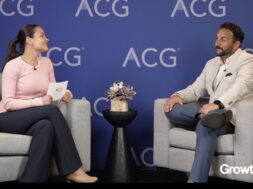Firms Focused on Smaller Deals Find Fundraising Success in a Challenging Year
While private equity fundraising fell sharply in 2023, some lower middle-market firms say their focus on founder-owned businesses and a diversified LP base helped them with capital raising efforts

As the books closed on 2023 and reports from research providers piled in, it came as no surprise that private equity fundraising totals was another metric to suffer last year. Amid a challenging macroeconomic backdrop and decreasing deal volume and exits, fund managers that sought to raise capital last year were met with an adverse capital raising environment.
According to S&P Global Market Intelligence, 1,936 private equity funds closed across the globe in 2023, which was the lowest number since 2017. It was down from 3,618 in 2022 and 5,080 in 2021.
For the firms that did manage to close funds last year, some say that a focus on smaller, founder-owned businesses—as well as a diversified LP base—helped them on the fundraising trail.
“2023 was the slowest and most challenging market we’ve ever seen,” says Chris Webber, managing director at placement agent Monument Group. LPs had a variety of unique challenges, Webber notes, and the private equity market is more mature than previous years with many investors already having PE allocations. “There aren’t a lot of new investors coming online.”
The Lower Mid-Market Advantage
For firms that did close funds last year, a focused strategy and good relationships with LPs were instrumental. Nickie Norris, co-founder at New Heritage Capital says her firm’s focus on high growth, founder-owned businesses helped her firm succeed. New Heritage closed its fourth fund in November at $438 million—above its $350 million hard-cap. The Boston-based firm typically invests in businesses that are looking for their first institutional capital. She adds that good returns, portfolios companies that performed well during COVID and continued exits helped bring in the capital. New Heritage specializes in what it calls the “private IPO,” which gives founders some liquidity, while getting new growth capital into a business.
“Lower middle-market specialists continue to get a lot of interest,” says Monument’s Webber. Firms that are focused on two or three sectors and know them well also have the upper hand, he adds.
Andrew Trigg, managing partner at New York-based private equity firm Graycliff Partners, says his firm took less than four months to close its fund, which was quicker than expected. The lower middle-market firm finalized the fundraise for its fifth buyout fund at $600 million in October. “Even though deal activity slowed down in 2023, we continued to see founder-owned businesses coming to market,” Trigg says. “There is continued opportunity for lower middle-market buyouts.”
Winning Over LPs
Firms that closed funds last year also say they benefitted from a diverse investor base and returning LPs. “Those who continued to foster relationships with LPs came out on top, but for others it was very challenging,” says Webber. Noting that it normally takes firms 12 months from first to final close, but the timelines last year averaged 18 months or more. Jessica Mead, regional executive for North America at fund administrator Alter Domus, says she didn’t see firms scrapping or discontinuing fund raises, but many took longer to close than normal.
At New Heritage, 75% of investors in the new fund were returning LPs while and the rest were new relationships. Some of its successful exits included a disposable medical products provider and a food ingredients business. New Heritage’s mix of investors was split between insurance companies, endowments, pensions, large asset managers, family offices and funds-of-funds. “We were able to add incremental names to our investor list and it was helpful that they had different appetites,” Norris says. “It was a good mix of LPs, so we didn’t have one large group with the same set of issues.” Norris says it took less than a year from the time of the first close to the final close. New Heritage invests in business services, healthcare and specialized manufacturing.
At Graycliff, the firm focuses on founder-owned business in the manufacturing and industrial services sectors. “Last year was a challenging fundraising environment. LPs primary focus is digging into returns,” says Trigg. He adds that his firm benefitted from exits and continuing to return money to LPs in its previous funds. The firm has already exited most of the investments in fund III and is planning exits for several fund IV investments. Graycliff remained cautious in 2023 because of market headwinds and made only two platform investments last year. Its LPs in its latest fund were a blend of re-ups and new relationships, including endowments, pensions, family offices and funds-of-funds.
LPs are very critical right now. They want to make sure you’re not coming back earlier than you need to, making sure the house is in order, and that you’re being pragmatic while continuing to do deals.
Chris Webber
Monument Group
“LPs are very critical right now. They want to make sure you’re not coming back earlier than you need to, making sure the house is in order, and that you’re being pragmatic while continuing to do deals,” Webber says. He notes that funds that have performed well and delivered exits have been able to still raise money.
Some larger funds, meanwhile, benefitted from an international mix of investors. Kelso & Company, which closed its Kelso Investment Associates XI fund in September at $3.3 billion, had a large presence among investors in Europe and Asia, as well as new relationships in Latin America and Australia, according to Lynn Alexander, head of investor relations and fundraising.
The firm invests in four core sectors, including financial services, business services, healthcare services and consumer. “We’re interested in durable recession-resistant businesses that we can grow organically and through acquisitions,” Alexander says. It took about two years from first to final close to raise the capital. One aspect that gives LPs confidence in the firm is that Kelso partners and employees always commit a significant amount of their own money to their funds. In this case, $400 million of the fund’s money came from Kelso employees.
“LPs have had a desire for increased alignment, on top of also wanting performance and transparency,” Alexander says. “We have one of the largest GP commitments in the industry.”
Despite some of these successes, fundraising was down significantly year-over-year. “2023 was the most challenging year for private equity in the last decade because of high interest rates, slow exits, limited M&A and limited liquidity and challenging economic conditions,” Alter Domus’ Mead says. “LPs want to see a proven track record and have deeper access to qualitative portfolio analysis.”
2023 Fundraising At a Glance:

Source: press releases
Anastasia Donde is Middle Market Growth’s senior editor.
Middle Market Growth is produced by the Association for Corporate Growth. To learn more about the organization and how to become a member, visit www.acg.org.


